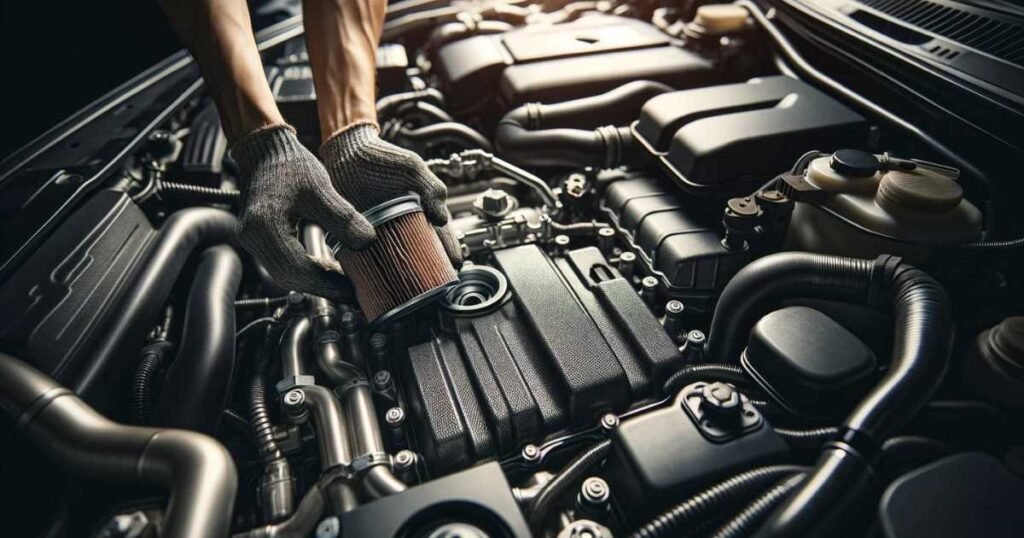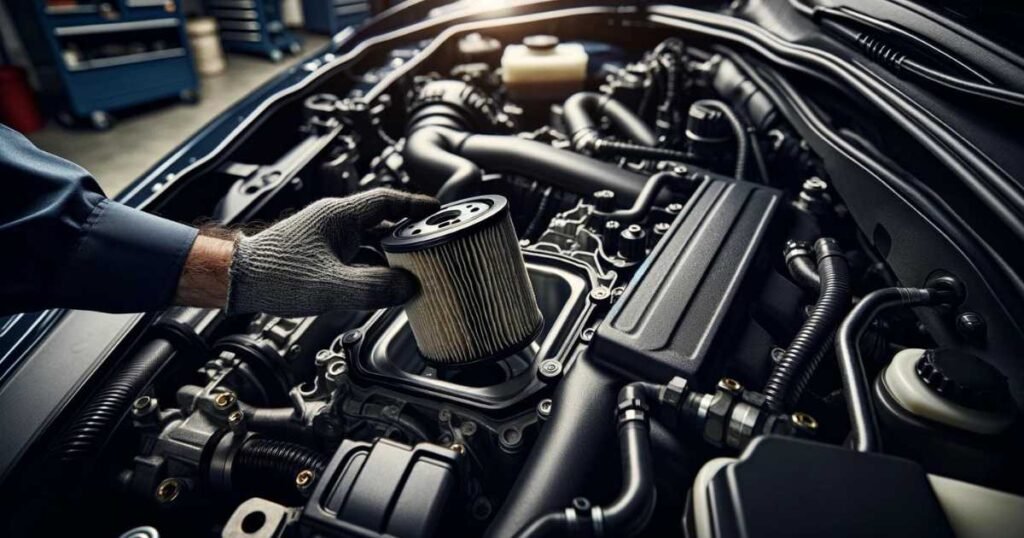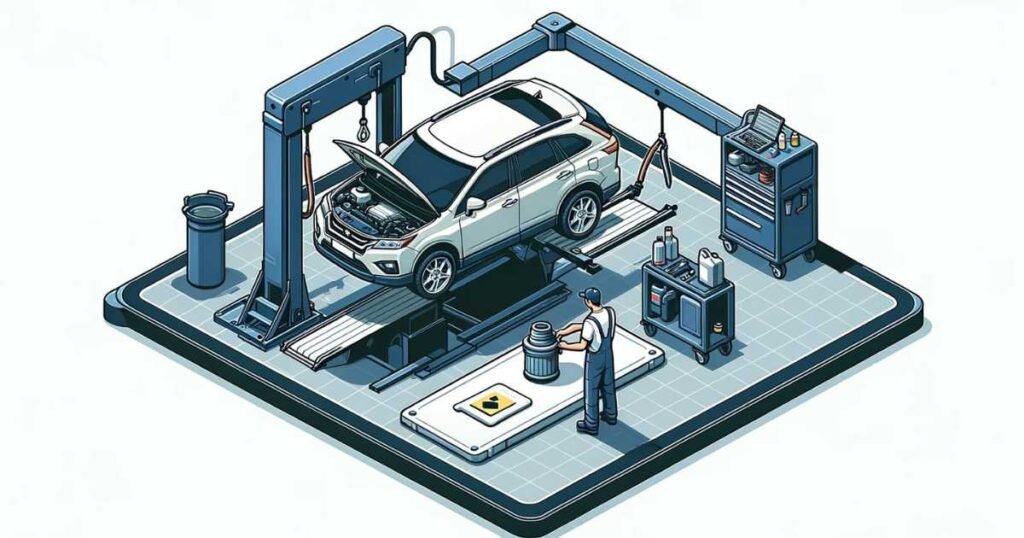After many years as a mechanic, I’ve learned a lot. The oil filter is crucial for your engine’s health. It acts like a security guard, keeping harmful particles from damaging the engine’s internals. A common question is whether to change the filter with every oil change. The answer isn’t always straightforward.
Caring for your car involves several essential tasks, with regular oil changes at the forefront. This often raises a question: should you also replace the oil filter? Although it might seem unnecessary, replacing the oil filter with each oil change is generally a wise decision.
Let’s dive deeper into the role of oil filters and why changing them is important.
In this article:
Do You Need to Change Oil Filter Every Oil Change?
Technically, no, replacing the filter with every oil change is optional.
Deciding whether to replace your car’s oil filter with every oil change is complex. Different automobile manufacturers offer varied recommendations.
Some suggest changing the oil filter every alternate oil change, which could be after driving approximately 6,000 to 12,000 miles. This varies based on the type of car and driving habits.
However, many mechanics advocate replacing the filter whenever you change the oil. Here’s why they recommend this:

Modern oil filters are excellent at trapping small particles and debris that could harm your engine.
Due to their effectiveness, these filters can become filled and clogged relatively quickly. Installing a new filter with each oil change ensures your engine remains clean and functions optimally.
Moreover, the cost of a new filter is relatively minor compared to the potential expense of repairing an engine damaged by accumulated dirt.
Additionally, it’s simply more practical to replace the filter as part of the oil change process. This approach avoids the need for an additional service appointment.
What is the Role of Your Oil Filter?
Motor oil is really important for your car’s engine. It reduces friction and keeps all the moving parts running smoothly. As the oil moves around the engine, it picks up dirt, grime, and tiny bits of metal. This is where the oil filter becomes helpful.
Think of the oil filter as a strainer in your kitchen. It catches all the bad stuff in the oil, like those bits of dirt and metal, and stops them from going back into the engine.
Clean oil is super important for your engine to work its best and last long. If the oil filter gets too full of dirt and grime, it can’t do its job well, and that’s not good for the engine.
What are the types of oil filters?
Oil filters are important parts of cars and come in two main types. The first type is called “spin-on filters.” These are very popular, and they work by screwing onto the engine block of the car. It’s like attaching a lid to a jar but for the car’s engine!
The second type is known as “cartridge filters.” These are different because they are placed inside a container called a canister. When changing this filter, you only need to replace the part that cleans the oil, not the whole canister.
This makes it like changing just the inside part of a toy rather than the entire toy. Both types help keep the car’s engine clean and running smoothly.
When should you change the oil filter, regardless of the oil change?
It’s really important to follow the instructions from the people who made your car when changing your oil filter. But sometimes, you might need to change it more often, especially in these situations:
- If you drive in tough conditions often, like in heavy traffic where you stop and go frequently, pull something heavy, or drive on dusty roads, your filter has to work harder.
- If you use a special kind of oil called synthetic oil, it’s good because it lasts longer. But even then, some car makers say you should change the filter every time you change the oil.
- Also, if you see that your filter is leaking or looks damaged, you should change it right away.
This is why changing the oil filter more often can be a good idea to keep your car running well.

What are the Signs You Might Need an Oil Change and Filter Replacement?
Taking care of your car by following the maintenance schedule is very important. However, sometimes your car might need an oil change and a new filter earlier than you think. Here are some signs to watch out for:
- There’s a light on your dashboard that looks like an oil can or says something about an oil change. This is a reminder to check your oil.
- Your car doesn’t seem as peppy as usual or feels a bit slow.
- You hear strange noises coming from the engine, like knocking or rumbling.
- When you check the oil, it looks dirty, dark, or has tiny bits in it.
If you notice any of these things, it’s a good idea to make an appointment with a mechanic who knows cars well.
They can check your oil and filter and change them if necessary. This helps keep your car happy and running smoothly!
What are the popular dealerships that offer both oil changes and oil filters?
Numerous establishments are available to assist you if your car requires an oil change.
Among these, Jiffy Lube is a convenient option that offers speedy oil changes. Valvoline Instant Oil Change also specializes in swift service. Meineke Car Care Centers provides a broader range of automotive services, including oil changes.
Pep Boys is another notable choice, where they change oil and perform other vehicle checks.
Lastly, your local dealership service center is a reliable source knowledgeable about your specific car model. Thus, you have a variety of choices for your car’s oil change needs!
What are the Oil Change and Filter Replacement Costs?
When you have your car’s oil changed and its filter replaced, the cost might vary with each visit. Several factors influence this fluctuation in price. Initially, the type of oil used is significant. You can choose between synthetic oil and conventional oil. Typically, synthetic oil is pricier than conventional oil.
The size and type of your vehicle also impact the cost. Larger vehicles, such as trucks or vans, may require more oil than smaller cars, potentially leading to a higher price for the oil change.
Your geographic location is another element that affects the price. In certain areas, the cost of living and services may be higher, leading to varying prices for an oil change from one region to another.
Furthermore, the service center where you get your oil changed influences the price. Each center sets its prices, so some might charge more while others could be more affordable.
On average, for a standard oil change and filter replacement, the cost ranges between $30 to $100. This variation depends on the oil type, your vehicle’s requirements, the area you live in, and the choice of service center.

What are the Benefits of Consistent Oil Filter Replacement?
Changing your car’s oil filter when you’re supposed to be helpful for a few reasons:
- It protects your engine: Think of the oil filter as a superhero for your car’s engine. It catches the bad stuff, like dirt and tiny particles, and stops them from moving around in the engine. This keeps your engine healthy and stops it from wearing out quickly.
- It helps your car run better: When the oil flows without any blockages, your engine gets all the oil it needs without any trouble. This makes your car run smoothly and helps it use less gas.
- It can keep your car’s value: If you take good care of it, like changing the oil and the oil filter regularly, it can be worth more when you want to sell it. It’s like ensuring your toys stay in good shape, so they’re worth more if you sell them later.
By doing this simple thing for your car, you’re making a big difference in its performance and longevity!
Final Verdict
Oil filters play a crucial role in keeping your vehicle running smoothly. They trap dirt and debris to keep your engine clean. It’s important to replace your oil filter regularly to maintain your car’s efficiency. You can find the specific guidelines for when to replace your filter in your owner’s manual, tailored to your vehicle model.
It’s also a good idea to consult with qualified mechanics. They have the expertise to offer practical advice on vehicle maintenance. Following these guidelines will help you keep your vehicle in top shape and optimize its performance.
Relevant:
What Does A Full-Service Oil Change Consists Of?
How Long Does an Oil Change Take?
What happens if you don’t change your oil?
FAQs
Can I reuse an oil filter?
While technically possible, reusing an oil filter is not recommended. The filter media can become clogged and lose effectiveness over time, potentially compromising engine protection.
Where is the oil filter located?
The location of the oil filter can vary depending on your vehicle’s make and model. It is typically found near the engine block, but it is recommended that you consult your owner’s manual for the exact location.
How can I find a qualified mechanic for oil changes and filter replacements?
Look for service centers with certified technicians and a reputation for using high-quality parts and following manufacturer recommendations.
Can I change my oil filter myself?
While it’s possible to change your oil filter yourself, you must have the proper tools, knowledge, and disposal methods for used oil and filters. If you’re unfamiliar with the process, it is generally recommended that you leave it to a professional mechanic.
What type of oil filter should I use?
Various oil filter options are available, and the best choice for your car depends on your vehicle’s make, model, and specific requirements. Consulting your owner’s manual or a trusted mechanic can help you determine the most suitable oil filter type.
What are the signs of a failing oil filter?
While a failing oil filter may not always present noticeable symptoms, unusual engine noises, low oil pressure warnings, and visible leaks around the filter housing can indicate potential issues.
Do I need to change the oil filter every service?
Not necessarily. The term “service” can encompass various maintenance tasks beyond just oil changes. If your service doesn’t involve changing the oil, the oil filter wouldn’t need replacing either. However, if the service includes an oil change, replacing the filter is highly recommended for the above reasons.
Can an oil filter last 2 years?
Keeping an oil filter for 2 years is not advisable, even if you have yet reached the recommended oil change interval. Oil filters are designed to trap contaminants; over time, they can become clogged, even if the oil has yet to degrade significantly. This can lead to reduced oil flow and potential engine damage.
Should I change the oil filter every time I change the oil?
While some car manufacturers recommend changing the filter every other oil change (typically around 6,000-12,000 miles), most mechanics recommend replacing the filter with every oil change for the abovementioned reasons.
However, it’s essential to consult your car’s owner’s manual for specific recommendations. Some newer vehicles equipped with long-life and synthetic oil filters might have extended filter change intervals.
Can I change the oil without changing the oil filter?
Yes, you can change the oil without changing the oil filter, but it’s strongly recommended to replace the filter every time you change the oil. Here’s why:
Modern oil filters are highly efficient and capture more contaminants than older models. Because of this, they can clog faster. If the filter gets too clogged, harmful particles could get back into the oil and damage your engine.
A fresh filter ensures your engine is well-protected. By replacing the filter, you guarantee that clean oil is circulating throughout your engine. This helps your engine run better and last longer.
The cost of a new filter is low, especially when you consider the potential cost of engine damage from a clogged filter. It’s much cheaper to replace a filter during a routine oil change than to fix engine problems caused by a clogged filter.
It’s also more convenient to replace the filter when you change the oil. Doing both at the same time saves you a trip back to the service center. This way, you can take care of everything in one go.
